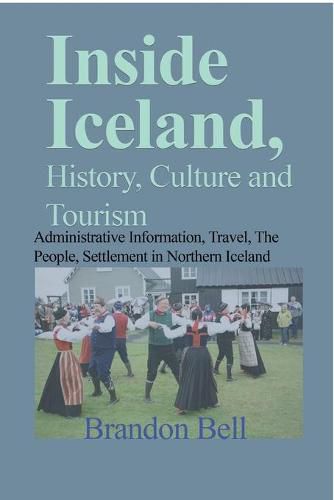Readings Newsletter
Become a Readings Member to make your shopping experience even easier.
Sign in or sign up for free!
You’re not far away from qualifying for FREE standard shipping within Australia
You’ve qualified for FREE standard shipping within Australia
The cart is loading…






This title is printed to order. This book may have been self-published. If so, we cannot guarantee the quality of the content. In the main most books will have gone through the editing process however some may not. We therefore suggest that you be aware of this before ordering this book. If in doubt check either the author or publisher’s details as we are unable to accept any returns unless they are faulty. Please contact us if you have any questions.
Inside Iceland, History, Culture and Tourism. Administrative Information, Travel, The People, Settlement in Northern Iceland. Government. Iceland has a multiparty parliamentary system, and there is a written constitution. Presidents are elected for four-year terms by direct popular vote but serve a parliamentary function and do not head a separate executive branch. The parliament is called Althingi after the medieval general assembly. It has sixty three members elected by popular vote for four-year terms. Each party puts forward a list of candidates, and people vote for parties, not candidates. The seats in the parliament are then distributed to parties according to the placement of people in their lists. Thus, elections have more to do with policies and positions on issues than with personalities. Leadership and Political Officials. After elections, the president asks one party, usually the one with the largest number of votes, to form a government of cabinet officers. There has never been a majority in the parliament, and so the governments are coalitions. The real political competition starts after elections, when those elected to the parliament jockey for positions in the new government. If the first party cannot form a coalition, the president will ask another one until a coalition government is formed. Cabinet ministers can sit in the parliament but may not vote unless they have been elected as members. This cabinet stays in power until another government is formed or until there are new elections
$9.00 standard shipping within Australia
FREE standard shipping within Australia for orders over $100.00
Express & International shipping calculated at checkout
This title is printed to order. This book may have been self-published. If so, we cannot guarantee the quality of the content. In the main most books will have gone through the editing process however some may not. We therefore suggest that you be aware of this before ordering this book. If in doubt check either the author or publisher’s details as we are unable to accept any returns unless they are faulty. Please contact us if you have any questions.
Inside Iceland, History, Culture and Tourism. Administrative Information, Travel, The People, Settlement in Northern Iceland. Government. Iceland has a multiparty parliamentary system, and there is a written constitution. Presidents are elected for four-year terms by direct popular vote but serve a parliamentary function and do not head a separate executive branch. The parliament is called Althingi after the medieval general assembly. It has sixty three members elected by popular vote for four-year terms. Each party puts forward a list of candidates, and people vote for parties, not candidates. The seats in the parliament are then distributed to parties according to the placement of people in their lists. Thus, elections have more to do with policies and positions on issues than with personalities. Leadership and Political Officials. After elections, the president asks one party, usually the one with the largest number of votes, to form a government of cabinet officers. There has never been a majority in the parliament, and so the governments are coalitions. The real political competition starts after elections, when those elected to the parliament jockey for positions in the new government. If the first party cannot form a coalition, the president will ask another one until a coalition government is formed. Cabinet ministers can sit in the parliament but may not vote unless they have been elected as members. This cabinet stays in power until another government is formed or until there are new elections